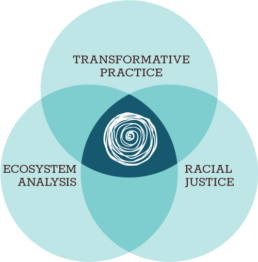Transformative Leadership for Change Fellowship recognizes the need for supporting leadership of color in Colorado
TLC is at the intersection of three core principles: transformative practice, ecosystem analysis, and racial justice. These principles holistically build leaders’ individual capacity and move these concepts into the core of Colorado’s social justice framework.
Strong leaders of color are here and already working in the landscape. The fellowship will raise their profile and build their network of powerful peers, funders, and political actors.
Transformative Practice
Transformative leadership takes into account the whole person in the system they inhabit, premised on the concept that a level of personal transformation and self-understanding is required to effectively fight for a parallel transformation in the world. No one leader needs the same thing, but TLC offers curriculum around concepts like owning one’s power, creating sustainable modes of working, undoing internalized oppression, and incorporating embodied practice that moves from a focus on the head only to one that includes the heart and the wisdom of the body. Importantly, transformative leadership programs are becoming more common in places like the Bay Area and New York, but few exist away from the coasts.
“I am so energized by hearing the stories of people impacted by our work. It has the potential to reshape lives so that our communities experience the success they deserve. It’s not speaking for them, but revealing the voice of the community.”
Racial Justice
Research on modern leadership development programs shows that our (white-male dominant) culture favors an “individual heroic” model that sees a person as inherently gifted, merited, talented, rather than seeing a leader as an amalgamation of the opportunities and privileges afforded to someone over the course of her life. Leaders who practice more collective leadership styles can be rendered invisible – they are told they are not being “leader-like”. Because TLC designed by and for people of color, with a strong gender lens, it can break from white-male normative models and instead lift up culturally relevant concepts of community and networked leadership.
“We need more spaces like this for Executive Directors of color to figure out sustainability for ourselves and for our organizations. It is very draining emotionally leading an organization as a person of color because we are dealing with issues of race and class in our organization and in our personal lives. Self-care and collaborating are key to sustaining and moving our work forward and staying healthy for the long-term.”
Ecosystem Analysis
TLC incorporates curriculum that helps leaders identify these barriers and experiment with different approaches. The way grassroots organizations are funded, including a severe lack of general operating support – the “I believe in you” money – was identified as a prime barrier to success. TLC intentionally engages funders in dialogue and community to consider new relational approaches that change funder-grantee dynamics.
“There are not enough groups that think in terms of big change in Colorado and a governing agenda, too much tinkering around the edges, not enough visionary work about what justice really looks like and how we could get there.”

